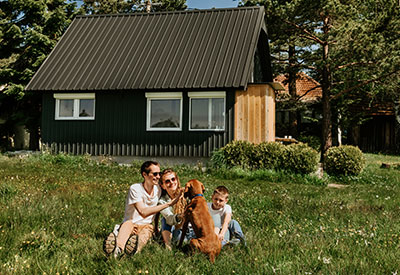Your family's cherished lakeside cabin or mountain retreat is the place where children learned to fish, teenagers shared secrets under starlit skies and multiple generations gathered for holiday celebrations. Now just think of the heartbreak of seeing this treasured property sold to strangers because of family disputes or estate complications. This scenario plays out far too often, but there's a powerful solution: the cabin trust. This strategy can help ensure your family's vacation property remains a source of joy and connection for generations to come.
What is a cabin trust?
A cabin trust is an estate planning tool that transforms how your vacation property is owned and managed. When you establish this irrevocable trust, you permanently transfer ownership of the property from your personal estate into a carefully structured legal entity. While the word "irrevocable" might sound intimidating, this permanence is actually one of the trust's greatest strengths – it provides the stability and protection needed to preserve your family's legacy.
Think of a cabin trust as creating a permanent home for your vacation property, complete with its own rules, funding and management structure. This isn't just a legal document; it's a blueprint for family harmony and continued enjoyment of a place that holds deep meaning for everyone involved.
Why should you consider a cabin trust?

The decision to establish a cabin trust often comes at a crucial moment – perhaps when you're beginning to think about your legacy, noticing tensions among family members about the property's use or becoming concerned about potential estate tax implications, either at the state or federal level. An effective cabin trust addresses multiple challenges simultaneously. It provides robust asset protection, shielding the property from personal creditors of both you and your beneficiaries. This means that even if a family member faces financial difficulties, the vacation property remains secure within the trust. The trust also can offer significant estate tax benefits by removing the property's value from your taxable estate – a crucial consideration as property values continue to appreciate in many desirable vacation areas.
How does a cabin trust work?
Imagine your cabin trust as a well-designed ship, with clear sailing instructions, a designated crew, and established rules for navigation. The trust agreement serves as your vessel's operating manual, providing detailed guidance for every aspect of property management and use. This comprehensive document outlines everything from how decisions are made about major repairs to who can use the property and when.
The trust operates through a carefully selected trustee or group of trustees who manage the property according to the trust's terms. These trustees might be family members, professional advisors or a combination of both. Their role is crucial – they ensure the trust's smooth operation while maintaining its intended purpose of preserving family harmony and protecting the property.
What should your cabin trust agreement include?
A well-crafted cabin trust agreement is comprehensive yet flexible enough to adapt to changing family circumstances. The agreement can address property management with the same level of detail you'd use in running a small business. This includes establishing clear protocols for maintenance, defining decision-making processes and creating systems for scheduling and use.
The financial framework is particularly crucial. Your trust should specify how ongoing expenses will be handled, including property taxes, insurance, utilities and maintenance costs. Many successful cabin trusts establish a reserve fund for major repairs and improvements, with clear guidelines for how family members contribute to these expenses.


Here are essential elements your trust agreement can address:
- Management structure. Define roles, responsibilities and decision-making processes, including how trustees are selected and replaced.
- Financial framework. Establish funding requirements, expense allocation and reserve fund management
- Usage guidelines. Create fair and transparent systems for property access and scheduling.
- Maintenance protocols. Outline regular maintenance requirements and procedures for handling repairs.
- Dispute resolution. Provide clear processes for addressing disagreements.
- Succession planning. Detail how ownership interests transfer to future generations.
What are the key benefits of a cabin trust?

The benefits of a cabin trust extend far beyond basic asset protection. Consider the peace of mind that comes from knowing your family's beloved vacation property will remain a source of joy rather than becoming a burden or source of conflict. The trust structure ensures that future generations will inherit not just a property, but a complete system for its successful management and enjoyment.
The asset protection benefits are substantial. By placing the property in trust, you create a legal shield that protects it from personal creditors, divorce settlements and other potential threats. This protection extends to all beneficiaries, ensuring that one family member's financial difficulties won't jeopardize everyone's enjoyment of the property.
The tax advantages can be equally significant. Beyond removing the property's value from your taxable estate, a properly structured trust can minimize transfer taxes across multiple generations. This means more of your family's resources can go toward maintaining and enjoying the property rather than paying unnecessary taxes.
What are the potential drawbacks of a cabin trust to consider?
Transparency about potential challenges is crucial when considering a cabin trust. The trust's irrevocable nature means its terms generally cannot be changed once established, underscoring the importance of thorough planning. This inflexibility, while providing long-term stability, requires careful consideration of future scenarios during the trust's creation.
The ongoing administration of a cabin trust demands attention and commitment. Regular maintenance, financial management and coordination among family members require consistent effort. However, many families find that this structured approach actually reduces conflicts and ensures the property receives proper care.
How do you implement a cabin trust?

Implementation begins with careful planning and honest family discussions. These conversations should address everyone's expectations, concerns and hopes for the property's future. Working with experienced estate planning professionals, you'll develop a trust agreement that reflects your family's unique needs and circumstances.
The actual implementation involves several key steps: transferring the property title to the trust (known as “funding” the trust), establishing necessary accounts and relationships with service providers, and setting up management systems. This process requires attention to detail and coordination among legal, tax and financial professionals to ensure everything is properly structured.
How do you ensure long-term success?
The long-term success of your cabin trust depends on regular communication and ongoing commitment from all family members. Annual family meetings provide opportunities to discuss property use, plan maintenance projects and address any concerns. These gatherings can also serve as occasions to celebrate and strengthen family bonds.
Professional oversight remains important throughout the trust's existence. Regular reviews with legal and financial advisors ensure the trust continues to serve its intended purpose and complies with all applicable regulations. Many successful cabin trusts also maintain relationships with local property managers and service providers who can assist with day-to-day maintenance and emergency responses.
Conclusion
Your family's vacation property is more than just real estate – it's a repository of memories and traditions that deserve protection. A cabin trust offers a proven way to preserve this legacy while preventing common pitfalls that often force families to sell beloved properties. The key is taking action before problems arise. An important first step is consulting with an experienced estate planning attorney who understands the unique challenges and opportunities presented by vacation properties. They can help you evaluate whether a cabin trust aligns with your family's goals and guide you through the process of creating an irrevocable trust that will serve your family for generations to come.



